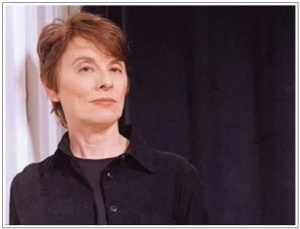Camille Paglia: Difference between revisions
Jump to navigation
Jump to search
(New page: Paglia is an outspoken critic of antisex values, especially as applied to BoyLove. :''"Minors who are given the power to say “no” to being sexually used by an abusive parent or relati...) |
mNo edit summary |
||
| (12 intermediate revisions by 6 users not shown) | |||
| Line 1: | Line 1: | ||
Paglia is an outspoken critic of | __NOTOC__[[Image:Camille paglia.jpg|thumb|Camille Paglia]]'''Camille Paglia''' (born 2 April 1947 in Endicott, New York) is a leading American [[Feminism|feminist]] academic, and an outspoken and often inopportune critic of anti-sex values, especially as applied to [[Boylove]]. Since 1984, Paglia has been a Professor at The University of the Arts in Philadelphia, Pennsylvania. Paglia has since backtracked slightly a la [[Peter Tatchell]], although it appears she would support a higher [[Age of Consent|age of consent]].<ref>https://www.rnz.co.nz/national/programmes/saturday/audio/2018642586/camille-paglia-free-women-free-men</ref> | ||
==On [[homosexuality|homosexuals]]== | |||
:''"Contemporary gays who try to distance themselves from this issue of boy-love are in effect committing cultural suicide. They're cutting themselves off from all the highest achievements of gay men..... Because I am a woman, and therefore I cannot be charged with man-boy love, I felt I had a moral obligation - and I don't recognize morality in most areas of life - a moral obligation to speak out against this kind of persecution in puritan Protestant culture, this persecution of a sensibility that as far as I can see has been intertwined with the highest achievements of art and intellect since the period of classical Athens".''<ref>http://home.wanadoo.nl/ipce/library_two/files/paglia_guide.htm</ref> | |||
[http://www.randomhouse.com/pantheon/paglia/ Personal Site] | ==See also== | ||
*[[Germaine Greer]] | |||
*[[Gayle Rubin]] | |||
==External links== | |||
*[http://www.randomhouse.com/pantheon/paglia/ Personal Site] | |||
*[http://en.wikipedia.org/wiki/Camille_Paglia Wikipedia article] - Broader detail on Paglia, including section on Child Sexuality. | |||
*[https://vdoc.pub/documents/free-women-free-men-sex-gender-feminism-hugpk9a6a5o0 Free Women, Free Men: Sex, Gender, Feminism] - book by Camille Paglia (2017) | |||
==References== | |||
{{reflist}} | |||
[[Category:Official Encyclopedia]][[Category:Gay]][[Category:People]][[Category:People: Academics]][[Category:People: Critical Analysts]][[Category:People: Sympathetic Activists]][[Category:People: American]] | |||
Latest revision as of 17:14, 11 August 2023

Camille Paglia (born 2 April 1947 in Endicott, New York) is a leading American feminist academic, and an outspoken and often inopportune critic of anti-sex values, especially as applied to Boylove. Since 1984, Paglia has been a Professor at The University of the Arts in Philadelphia, Pennsylvania. Paglia has since backtracked slightly a la Peter Tatchell, although it appears she would support a higher age of consent.[1]
On homosexuals
- "Contemporary gays who try to distance themselves from this issue of boy-love are in effect committing cultural suicide. They're cutting themselves off from all the highest achievements of gay men..... Because I am a woman, and therefore I cannot be charged with man-boy love, I felt I had a moral obligation - and I don't recognize morality in most areas of life - a moral obligation to speak out against this kind of persecution in puritan Protestant culture, this persecution of a sensibility that as far as I can see has been intertwined with the highest achievements of art and intellect since the period of classical Athens".[2]
See also
External links
- Personal Site
- Wikipedia article - Broader detail on Paglia, including section on Child Sexuality.
- Free Women, Free Men: Sex, Gender, Feminism - book by Camille Paglia (2017)